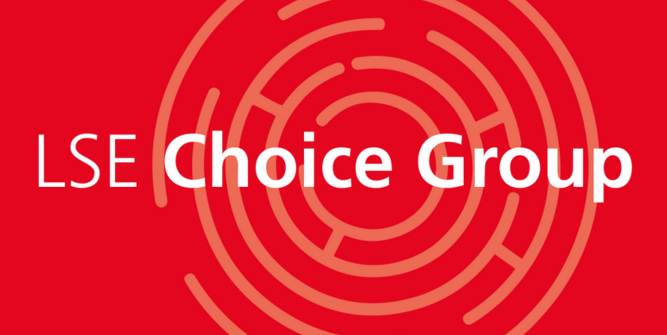Event Categories: BSPS Choice Group Conjectures and Refutations Popper Seminar Sigma Club

- This event has passed.
Choice Group Seminar by Zhongwei Xu (LSE Philosophy) and Vita Kudryavtseva (LSE Philosophy)
22 May 2024, 4:30 pm – 6:00 pm
Event Navigation

Different location! SAL G.03. Campus map: https://www.lse.ac.uk/lse-information/campus-map
Zhongwei Xu (LSE Philosophy): The Weight of Evidence, Counterfactual Resilience & Epistemic Luck
Abstract: It has been well-established in the literature that credence backed by weightier evidence is more resilient to learning new evidence in the future. In this paper, I show that such credence is also more resilient counterfactually. It would have changed by a relatively small margin even if things had been different in the past. I further show that this counterfactual resilience means the credence is less susceptible to a particular kind of epistemic luck, what I would call evidential-doxastic luck. The susceptibility to epistemic luck can give us another lens to see ambiguity aversion as a kind of counterfactual-dependent preference.
Vita Kudryavtseva LSE Philosophy): The making of a decision: Ellsberg variations
Abstract: An ambiguity-sensitive agent facing a dynamic decision situation is purported to exhibit several problematic behaviours: sensitivity to irrelevant “sunk cost”, dynamic inconsistency, and information aversion. Taken at face value, these “offenses” are severe enough to call into question the rationality of ambiguity-sensitive behaviours at large. This surprising implication of dynamic analysis does not square well with strong intuitions that support choices in the original Ellsberg thought experiment. Specifically, I consider a dynamic “Ellsberg-like” thought experiment put forth by All-Najar/Weinstein (2009). I argue that while the decision situation may be considered fully specified from the experimenter’s point of view, the agent still has work to do structuring the decision problem completely. Drawing on the literature in decision systems analysis (Nappelbaum, 1997) and social psychology (Humphreys, 2007), I present two alternative ways of structuring the situation. Any decision representation encodes a number of subjective commitments – my goal is to make these commitments explicit. I hope to show that the dynamic problem is not an innocuous extension of the original Ellsberg “experiment”: these are substantially different decision problems when viewed from the agent’s perspective. I highlight additional assumptions about a decision-maker’s preferences that are required to infer the agent’s behaviour in settings when uncertainty is resolved in stages. These assumptions, distinct and independent from static Ellsberg preferences, should make one question any verdicts on the rationality of attitudes to ambiguity made on the basis of the dynamic analysis.
Zhongwei Xu and Vita Kudryavtseva are PhD students at LSE Philosophy.
This event will take place in person on LSE’s campus. However, those unable to attend in person will have the option of taking part online.
To join online just follow these instructions:
- Download Zoom
- Zoom link for this for this meeting: https://lse.zoom.us/j/6613924533
Please note that these events are routinely recorded, with the edited footage being made publicly available on our website and YouTube channel. We will only record the audio, the slides and the speaker and will not include the Q&A section. However, any question asked during the talk itself will feature in the final edit.

